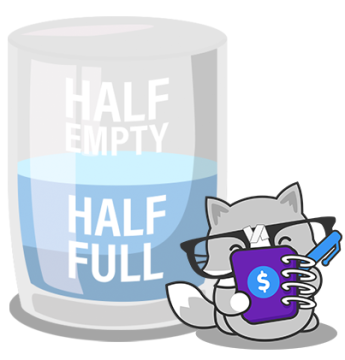How To Use Positive Reevaluation To Improve Your Trading Performance
In life, we often try to compartmentalize things to make sense of them. For example, we separate what we like from what we dislike, what we are good at from what we are bad at, and what makes us happy from what makes us sad.
As a result of this division, it is only natural that we gravitate towards those that make us feel good. We downplay failings as simply “this one time,” accidents, or even just plain bad luck. Sometimes, we just ignore them altogether.
And just like in life, we see this happen often in trading.
 Suppose you’re trade suddenly goes in the red because of some news event that you failed to consider. Out of frustration, you decide to widen your stop and let your trade ride. Eventually, your trade goes back to breakeven and you end the day flat. You focus on the “positive” result, and move on to the next trade.
Suppose you’re trade suddenly goes in the red because of some news event that you failed to consider. Out of frustration, you decide to widen your stop and let your trade ride. Eventually, your trade goes back to breakeven and you end the day flat. You focus on the “positive” result, and move on to the next trade.
While you did not lose a cent in the trade, you also did not learn from it. The next time a similar event happens, you could end up doing the same thing, but with a very different, possibly devastating, result.
Ask yourself, “Am I only thinking positively because I do not want to recognize my weaknesses?”
It may sound counterproductive, but you have to embrace your weaknesses to grow. Choosing to look past your weaknesses is akin to sweeping clutter under the rug. Yes, it may look “neat” for now, but in time, the clutter will build up and create a huge mess.
Embracing shortcomings is something you, as a trader, must learn to do because there is ALWAYS something to be learned in trading. The world of currency trading operates in a dynamic environment that shows no mercy to those who stand still.
You might even say that you have more to learn from your weaknesses and losses than from your strengths and wins. Chinks in your armor give you a concrete target to work on improving. Ultimately, overcoming your own Achilles heel is what will make you a more well-rounded trader.
So what can you do to “embrace weakness”?
Instead of treating your weaknesses negatively, look at it under a new light in a process called positive reevaluation.
For illustrative purposes, let’s take a trader who has a habit of using stops that are way too tight because he’s afraid of losing too much.
As of late, he’s getting stopped out a lot and ends up with a long losing streak. This makes him even more terrified of putting trades on and losing more money. He now finds himself stuck in a very vicious cycle that’s freezing him up.
You could say that this trader’s attitude towards trading is negative, but through the process of positive reevaluation, he can actually use this underlying weakness as strength.
Rather than focusing on the fear of losing, the trader can use this fear to positively reevaluate his trading and see it as a position-sizing problem. He can cut down on his position sizes so he can take even smaller risks while at the same time widening his stops.
If you can twist a perceived negative thought, tendency, or trait into a positive one, you can get it to work for you rather than against you.
Take a look at how Stephen Curry of the Golden State Warriors uses his small stature to his advantage. In a sport where being tall is a definite plus, Steph doesn’t let his relatively short 6’3″ frame hold him back.
Rather than seeing it as a drawback, he uses his speed and finely tuned skills to blow by defenders for the quick layup, or make space for the second he needs to shoot the three ball.
Of course, the same positive approach can apply in trading.
Let’s say that as a trader, you’re easily overcome with emotion when your trade starts to go against you. As a result, you tend to widen your stop when your trade is losing.
A bit of positive reevaluation can help you shift focus away from how this tendency holds you back and towards how it can help you.
Since you know deep inside that these emotions sprout when market conditions become unfavorable for your trade, when you find yourself wanting to widen your stops, you can actually use it as a potential signal to cut losses or trim your position.
Basically, instead of letting it take over you, you end up using your emotions as a signal to make better trading decisions.
So you see, looking at a problem from a different angle can go a long way in helping you improve your trading. It can offer you new insights on how to approach a problem, and heck, it can even help you turn your perceived weaknesses into strengths!


Comments are closed.